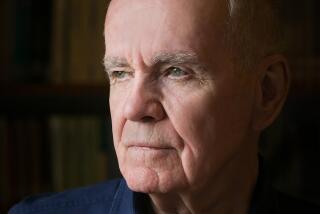For Only the Most Dedicated Joycean, of Course
- Share via
Every literary conference produces at least one session marked by eccentricity and obscurity. Some have the saving grace of wit; most are intense expressions of weird seriousness. Once, at the Hemingway Festival in Key West, a professor displayed blown-up photographs he’d taken at Papa’s farmhouse in Cuba and proceeded to discuss--not the history of the place, or anecdotes about visitors or the fiction written within the walls, but a detailed examination of the shrubbery in the yard. “Now,” the professor said, pointing a long pointer, “doesn’t this look like a small yew tree?”
At Cheltenham ‘97, the prize winner in the strange-and-wonderful department was “A Voyage Around My Father,” about John Joyce, dad to James.
The lecturer, a young Irishman named John Wyse Jackson, entered the room wearing sandals on a raw October night. Clearly, this was not a man bothered with mundane concerns. Here was a Joycean, a man with a faith and a cause. As he spoke, he also proved funny, sweet and cognizant of the excesses of other Joyceans.
He sat down with a great pile of papers in his lap and began: “I’ve only spoken about this once. In Trieste, of all places, where James Joyce lived, of course, with Nora and the children. There were 40 engaged Joyceans present and several baffled Italians.”
He proceeded to lecture on John Joyce’s family history--and may have gone back a bit too far because, 50 minutes into the hourlong lecture, he only had just arrived at John’s wedding to James’ mother. “Well,” Jackson said of his subject, “at least I got him married for you. Any questions?”
There were many. The audience was in Joyce heaven. Answering the questions, Jackson got to his point, that John Joyce was the greatest living influence on his son as a writer, giving him his humor, his delight and obsession with turning language on its ear and his passion for music, which created the most musical of prose styles.
He also passed on his dedication to drink and harebrained economic schemes, his love-hate affair with his native land and his never-ending enmity toward those who betrayed him or, more importantly, he thought had betrayed him.
John Joyce was a great rogue and raconteur, a perfect source of material for a literary artist. But Jackson emphasized that James Joyce’s father also was a monster, an abusive and violent drunk who humiliated his children (all but James, his favorite) on a daily basis, and who left them to fend and care for themselves while he was holding the bar with his own stories.
Though this was the festival’s only event devoted to Joyce, he was mentioned and discussed by every single Irish writer. If, as they say, Yeats is Everest for every Irish poet, so is Joyce for the writers of prose. There. Always there. John Banville said, “Joyce put everything in, Beckett took everything out. Doesn’t leave much for the rest of us.”
But there’s a lot left for the student.
More to Read
Sign up for our Book Club newsletter
Get the latest news, events and more from the Los Angeles Times Book Club, and help us get L.A. reading and talking.
You may occasionally receive promotional content from the Los Angeles Times.










